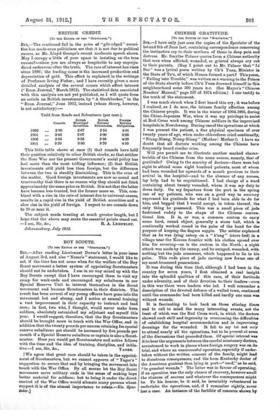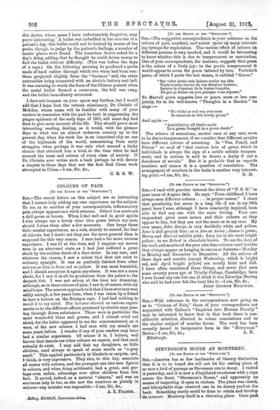CHINESE GRATITUDE.
[To THE EDITOR Or THY "SPECTATOR."] STR,—I have only just seen the copies of the Spectator of the 1st and 8th of June last, containing correspondence concerning the instinctive cry to their mothers of those in deep pain and distress. Mr. Smythe Palmer quotes from a Chinese authority that men when afflicted, wounded, or grieved always cry out to their parents. (May I point out to Mr. Palmer that "Li Sao" was a lyrical poem written by Ch'il Yuan, Minister in the State of Ts`u, of which Hunan formed a part P This poem, " Falling into Trouble," was written as a warning to the Prince of the State shortly before Ch`ii. Yuan drowned himself in this neighbourhood some 300 years B.C. (See Mayer's " Chinese Readers' Manual," page 107 of 1874 edition.) I can testify to the truth of the statement.
I was much struck when I first heard this cry ; it was before I realized, as I do now, the intense family affection among the Chinese people. It was in the winter of 1904-1905, during the Chino-Japanese War, when it was my privilege to assist at Red Cross work among Chinese soldiers in the improvised hospitals in Newchwang. During one of the operations at which I was present the patient, a fine physical specimen of over twenty years of age, when under chloroform cried continually, " Niang-Niang, Niang-Niang " (Mother ! Mother !) I have no doubt that all doctors working among the Chinese have frequently heard similar cries.
Will you permit me to illustrate another marked charac- teristic of the Chinese from the same source, namely, that of gratitude ? Owing to the scarcity of doctors—there were but eight to attend some eight hundred patients, most of whom had been wounded for upwards of a month previous to their arrival in the hospital—and to the absence of any nurses, lay help had to be requisitioned. I had charge of a ward containing about twenty wounded, whom it was my duty to dress daily. On my departure from the port in the spring one of my patients, who was on a good way to recovery expressed his gratitude for what I had been able to do for him, and begged that I would accept, in token thereof, the only thing he possessed. This was a small piece of jade fashioned rudely to the shape of the Chinese conven- tional lion. It is, or was, a common custom to early some hard, round object, generally a stone ball, which is continually worked round in the palm of the hand for the purpose of keeping the fingers supple. The soldier explained that as he was lying asleep on a " leang " (stove bed) in a village near the Korean frontier with his clothes spread over him for covering—as is the custom in the North ; a night attack was made by the enemy, and he escaped, wounded, with nothing but the jade ornament, which happened to lie in his palm. This rude piece of jade carving now forms one of my most treasured possessions.
It was during this time that, although I had been in the country for seven years, I first obtained a real insight into the splendid qualities of this race, of their fortitude under adversity, and of their devotion to their leaders—even in this war there were leaders who led. I well remember a description of the devoted defence of a walled town, continued until the commander had been killed and hardly one man was without wounds.
It is fascinating to look back on those stirring times and to call to mind the many interesting events, not the least of which was the Red Cross work, in which the doctors showed such skill and ingenuity in overcoming the difficulties
of establishing hospital accommodation and in improvising dressings for the wounded. It fell to my lot not only to attend nearly all the operations, but to be present at some of the discussions that preceded them. Of special interest was it to hear the arguments between the careful missionary doctors, accustomed to work in places where foreign surgery was on its trial, and where an unsuccessful operation, especially if under- taken without the written consent of the family, might lead to disastrous consequences, and the keen Kentucky doctor of the American gunboat then lying in port—" used," as he said, "to gunshot wounds." The latter was in favour of operating, if an operation was the only chance of recovery, however small the chances of success and whatever the consequences might be. To his honour, be it said, he invariably volunteered to undertake the operations, and, if I remember rightly, never lost a case. An instance of the fertility of resource shown by
this doctor, whose name I have unfortunately forgotten, may prove interesting.: A bullet was imbedded in the muscles of a patient's leg : this bullet could not be located by means of the probe, though, to judge by the patient's feelings, a number of tender places were found. The American doctor asked for a day's delay, adding that he thought he could devise means to find the bullet without difficulty. (This was before the days of a rays.) On the following morning he produced a probe made of bard rubber through which two wires bad been run: these projected slightly from the " business " end, the other extremities being connected with an electric battery and bell. It was amusing to watch the faces of the Chinese present when the metal bullet formed a connexion, the bell was r ung, and the bullet immediately extracted.
I dare not trespass on your space any further, but I would add that I hope that the veteran missionary, Dr. Christie of Mukden, whose name will be familiar with many of your readers in connexion with the part he took in suppressing the plague epidemic of the early days of 1911, will some day find time to give some account of his life. This should prove most interesting reading, dealing, as it would, with the pioneer days in what was an almost unknown country up to the present day, when his work lies in an important city on one of the highroads of the world, commencing from early struggles, when perhaps it was only what seemed a lucky chance that obtained him a trial, to the time when he had secured the trust and esteem of every class of society. If Dr. Christie ever writes such a book perhaps he will devote a chapter to those days that saw the first Red Cross work attempted in China.—I am, Sir, &e., C. E. S. W.



































 Previous page
Previous page